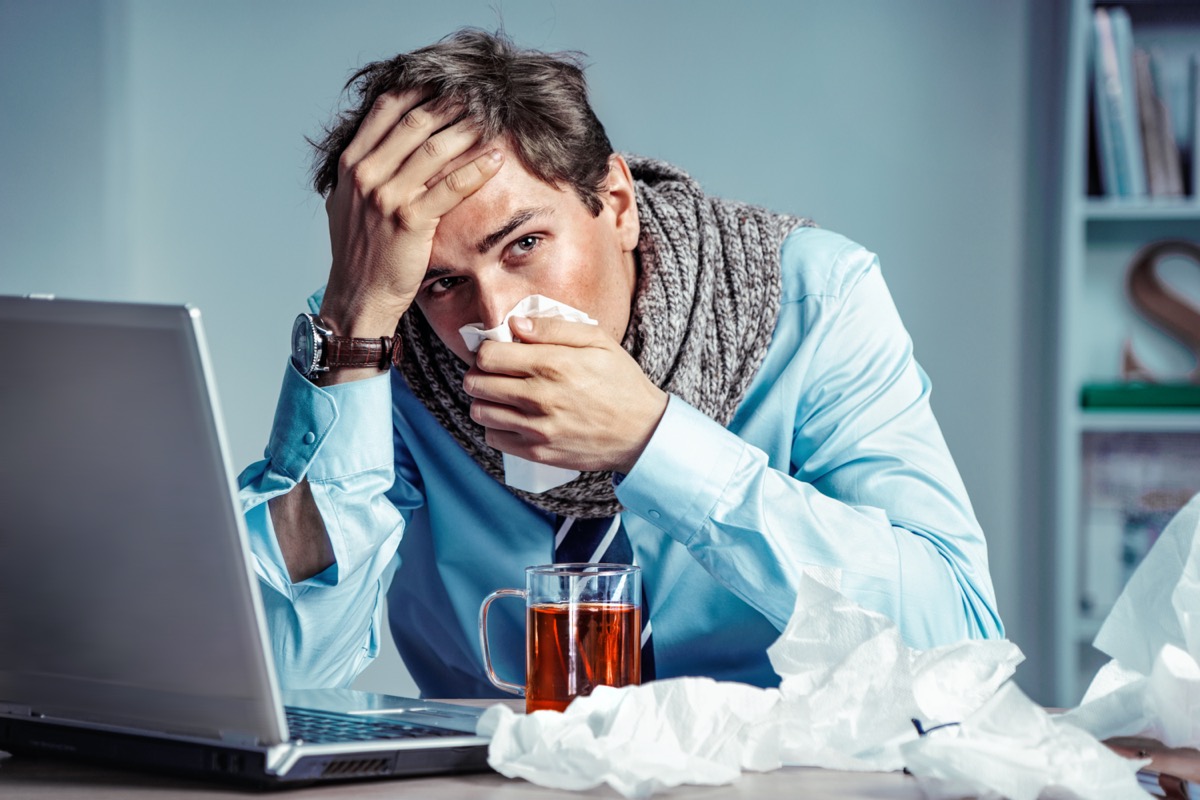Flu season is here and health officials are concerned about this winter because of the rise of influenza cases. "We've noted that flu activity is starting to increase across much of the country, especially in the Southeast and south-central US," CDC director Dr. Rochelle Walensky tells NBC News. "Not everybody got flu vaccinated last year, and many people did not get the flu. So that makes us ripe to have potentially a severe flu season."
Other experts agree that this winter might be brutal and worry how it will affect hospitals. Bernadette Boden-Albala, MPH, DrPH, Director and Founding Dean, University of California, Irvine Program in Public Health tells Eat This, Not That! Health tells us, "Based on the CDC FluView report of the 2022-2023 flu season, there are signals that we are having an early start to the flu season. With both influenza and SARS-CoV-2 viruses circulating at the same time, vaccination against both is needed to mitigate against overburdening health care systems as well as the threat to the health and safety of the public at large."
The CDC states, "estimates that flu has resulted in 9 million – 41 million illnesses, 140,000 – 710,000 hospitalizations and 12,000 – 52,000 deaths annually between 2010 and 2020," and experts are bracing for the worst this year. Dr. Ehsan Ali, board-certified in Internal Medicine and fellowship-trained in Geriatric Medicine, founder and CEO of Beverly Hills Concierge Doctor and Urgent Care explains to Eat This, Not That! Health, "Last year, people were mandated to wear a mask therefore, there was a lot less flu diagnosis seen. This year, since the majority of people are not wearing a mask, there will be an increase in the incidence of flu. However, it is not expected to be any more serious in severity." Read on—and to ensure your health and the health of others, don't miss these Sure Signs You've Already Had COVID.
Dr. Barbara Bawer, Family Medicine Physician with The Ohio State University Wexner Medical Center says, "Yes, the flu is expected to be worse than previous seasons. We have not had many cases of the flu over the last couple of years due to the pandemic, mask mandates and people practicing better hand and cough hygiene overall. Many people chose to also forgo flu vaccines the last few seasons as a result. Therefore we have far less population immunity to the virus which will likely lead to a more severe flu season this year."
David Cutler, MD, family medicine physician at Providence Saint John's Health Center in Santa Monica, CA adds, "Predictions about the upcoming flu season are based on certain assumptions. These assumptions include which flu virus strains will be circulating, how contagious and serious those strains will be, how people will behave in terms of travel and wearing masks, how many people will get vaccinated or receive treatment, and the accuracy of flu disease data collection. Since there is obviously significant uncertainty in each of these individual factors, it is understandable that there becomes great uncertainty in predicting the severity of the upcoming flu season."

Dr. Boden-Albala reveals, "Over the past two flu seasons, there has been a drop in flu vaccinations especially among higher risk groups, including children and pregnant people. Often flu activity first increases in children and then spreads to older age groups. These trends signal a potentially worse flu season compared to previous years."
Dr. Cutler says, "The strains predicted to affect the United States are generally those which impact the Southern Hemisphere in the preceding months (their winter, our summer). These are also the strains which are protected against in the current flu vaccines. All nine FDA approved flu vaccines protect against the same four variants. However, protection against disease is far from perfect and the strains in circulation may vary as the flu season progresses."

Dr. Boden-Albala reminds people, "If you have the flu, take everyday precautions to protect your loved ones and the community while sick. Try to stay home, when you feel better and if you must be outside, cover your nose and mouth when you cough or sneeze and wash your hands often with soap and water. "
Dr. Christopher Kang, Board Certified, American Board of Internal Medicine, Primary physician at Health 1 Care says, "If you do contract the virus, it is best to limit contact with others as much as possible to keep from infecting them. Stay at home and get rest, making sure to stay hydrated. You can take over-the-counter fever-reducing medications such as Tylenol to alleviate symptoms. If you are in a higher-risk group, or are very sick or worried about your illness, contact your healthcare provider."

Dr. Cutler tells us, "Severe cases of flu are distinguished from simple colds by body aches, high fever and shortness of breath. Breathing difficulties result from pneumonia, where the influenza virus infects the lungs. The progression of pneumonia leading to decreased oxygen levels in the blood is what causes death in some cases of the flu.
Antiviral treatment is available by prescription for those at high risk with significant disease. But remember that an ounce of prevention is worth a pound of cure. Vaccines and effective masking are great ways to prevent the flu and covid." Dr. Boden-Albala says, "Flu symptoms can be some or all of these symptoms: fever or feeling feverish/chills, cough, sore throat, runny or stuffy nose, muscle or body aches, headaches, fatigue, and some people may have vomiting and diarrhea."

Dr. Bawer says, "You can protect yourself from the flu by getting vaccinated. Wearing a mask in public and washing hands can also help to prevent the flu. Avoiding others who are sick is also important to limit your chances of exposure."
Dr. Kang adds, "Protection from the flu begins with small everyday actions. One should avoid close contact with people who are sick, cover coughs and sneezes, wash one's hands often with soap and water, and avoid touching one's eyes, nose, and mouth. It is also always recommended to anyone above the age of 6 months to receive the annual flu vaccine for immune protection in case of contact with the virus."
The post Sure Signs You Have the Flu as CDC Director Issues Warning appeared first on Eat This Not That.
----------------
By: Heather Newgen
Title: Sure Signs You Have the Flu as CDC Director Issues Warning
Sourced From: www.eatthis.com/sure-signs-you-have-the-flu/
Published Date: Sat, 29 Oct 2022 11:15:47 +0000
Read More
 HealthWellnessFitnessBeautyVideosPrivacy PolicyTerms And Conditions
HealthWellnessFitnessBeautyVideosPrivacy PolicyTerms And Conditions
